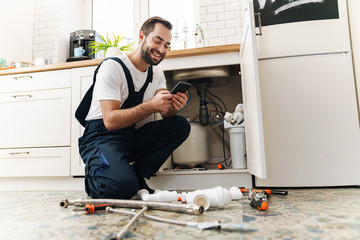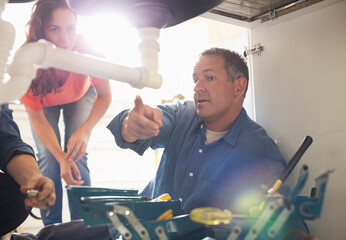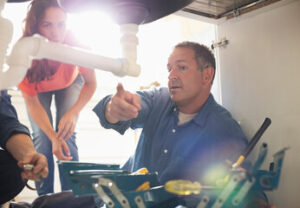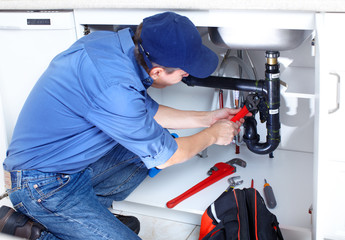Plumbing plays a vital role in maintaining a functional and comfortable living space. A well-designed plumbing system ensures proper water flow and waste removal. Efficient plumbing minimizes the risk of leaks and damage. It also contributes to water conservation and energy efficiency.
Planning a plumbing system requires careful consideration of layout and material selection. Pipe placement affects water pressure and flow consistency. High-quality materials prevent corrosion and leaks over time. Proper insulation helps maintain water temperature and reduce energy loss. Contact Plumbing Express, Inc. for professional help.
Water supply lines must be carefully installed to prevent contamination and pressure issues. Direct routes from the main supply reduce resistance and improve flow. Flexible connections allow for expansion and contraction due to temperature changes. Proper sealing prevents leaks and maintains pressure consistency.
Drainage systems require strategic design to prevent backups and odors. Gravity-assisted slopes allow waste to flow freely. Vent pipes maintain air pressure and prevent sewer gases from entering living spaces. Proper trap installation blocks odors and creates a sanitary environment.
Fixture placement affects both convenience and system efficiency. Shorter pipe runs reduce pressure loss and improve response time. Grouping fixtures minimizes material use and installation complexity. Consistent pressure levels enhance user comfort and system reliability.
Water pressure regulation is essential for system longevity. Excessive pressure strains pipes and joints, leading to leaks. Pressure-reducing valves maintain safe levels and prevent damage. Balanced pressure also improves fixture performance and reduces noise.
Hot water delivery systems improve comfort and efficiency. Tankless heaters provide instant hot water and reduce energy waste. Proper pipe insulation maintains temperature and prevents heat loss. Recirculation systems reduce wait times and water waste.
Leak detection technology enhances system integrity. Smart sensors identify moisture changes and send alerts. Early detection prevents structural damage and mold growth. Automatic shut-off valves stop water flow during emergencies.
Eco-friendly plumbing options reduce resource consumption and environmental impact. Low-flow fixtures maintain performance while using less water. Greywater recycling systems reuse water for irrigation and flushing. Rainwater harvesting supplements supply and reduces utility costs.
Pipe material selection influences durability and maintenance requirements. Corrosion-resistant metals and plastics prevent leaks and blockages. Flexible piping accommodates movement without cracking. Proper joining techniques ensure long-term reliability and strength.
Drain maintenance prevents clogs and slow drainage. Regular cleaning removes buildup and improves flow. Enzyme-based cleaners protect pipes from damage. Proper disposal of grease and debris prevents blockages and backups.
Frozen pipes pose a risk in colder climates. Insulated pipes prevent freezing and bursting. Heat tape and proper ventilation maintain consistent temperatures. Early detection and thawing prevent costly damage.
Septic and sewer systems require regular inspection and maintenance. Pumping and cleaning prevent overflow and contamination. Bacterial treatments support waste breakdown and system health. Proper venting maintains pressure balance and odor control.
Bathroom plumbing combines functionality with aesthetics. Wall-mounted fixtures save space and simplify cleaning. Water-saving toilets and faucets reduce consumption. Proper drainage prevents standing water and mold growth.
Kitchen plumbing supports meal preparation and cleanup. High-pressure faucets improve washing efficiency. Garbage disposals reduce waste and prevent clogs. Under-sink filtration systems improve water quality and taste.
Outdoor plumbing extends functionality beyond the home. Irrigation systems provide consistent watering and conserve resources. Frost-proof spigots prevent damage in cold weather. Drainage solutions prevent flooding and soil erosion.
Plumbing upgrades increase home value and efficiency. Modern fixtures improve performance and reduce waste. Updated pipe materials extend lifespan and reduce maintenance costs. Smart water systems offer convenience and real-time monitoring.
Noise reduction enhances plumbing comfort. Pipe insulation dampens sound and prevents vibration. Water hammer arrestors reduce sudden pressure changes. Proper fixture installation minimizes rattling and echoing.
Plumbing venting maintains air pressure balance and waste flow. Roof vents release sewer gases safely. Proper vent placement prevents airlocks and drainage issues. Consistent air pressure supports smooth waste removal.
Water filtration improves safety and taste. Carbon filters remove chlorine and contaminants. Reverse osmosis systems eliminate heavy metals and impurities. Whole-house filtration ensures consistent water quality at every fixture.
Water softening reduces mineral buildup and improves appliance longevity. Ion-exchange systems remove calcium and magnesium. Soft water reduces scale formation and increases soap efficiency. Reduced mineral content improves plumbing performance.
Backflow prevention protects water supply from contamination. Check valves and air gaps block reverse flow. Regular testing ensures proper function and safety. Municipal codes often require backflow prevention in commercial systems.
Corrosion control extends pipe lifespan and maintains flow quality. Protective coatings and anode rods reduce metal degradation. Balanced pH levels prevent chemical reactions. Non-metallic pipes offer resistance to corrosive environments.
Plumbing retrofits improve efficiency and reduce costs. Dual-flush toilets provide flexible water use. Low-flow showerheads maintain comfort while conserving water. Smart leak detectors prevent damage and waste.
Water heater maintenance improves performance and lifespan. Flushing removes sediment and improves heating efficiency. Anode rod replacement prevents tank corrosion. Temperature settings balance comfort and energy savings.
Stormwater management reduces flooding and property damage. Permeable surfaces improve drainage and groundwater recharge. Retention basins control runoff and prevent erosion. Proper grading directs water away from foundations.
Pipe sizing affects system performance and flow consistency. Larger pipes improve pressure and reduce noise. Smaller lines maintain consistent flow to individual fixtures. Proper sizing prevents bottlenecks and imbalances.
Fixture upgrades improve aesthetics and functionality. Touchless faucets reduce germ spread and improve convenience. High-efficiency toilets minimize water use without sacrificing performance. Custom showerheads enhance comfort and style.
Pressure balancing valves improve shower performance. Consistent temperature and pressure reduce scalding risk. Automatic adjustment prevents cold-water shock. Balanced systems enhance comfort and safety.
Underground plumbing requires durable materials and proper installation. Flexible piping accommodates soil movement. Protective coatings resist corrosion and chemical exposure. Leak detection systems monitor underground lines for damage.
Emergency shut-off valves protect against sudden leaks and bursts. Accessible valve placement allows quick response. Automatic shut-off systems enhance protection during absences. Routine testing ensures proper function.
Trap maintenance prevents odor and backup issues. Clean traps maintain proper seal and flow. Proper venting prevents siphoning and drainage issues. Trap primers maintain water levels and odor control.
Water usage monitoring supports conservation and cost control. Smart meters track consumption and identify leaks. Usage data helps adjust habits and reduce waste. Automated shut-off systems prevent overuse and damage.
Plumbing system zoning improves efficiency and control. Separate zones for bathrooms, kitchens, and outdoors allow targeted maintenance. Shut-off valves provide isolated control during repairs. Balanced pressure improves overall system performance.
Sump pump maintenance prevents basement flooding and water damage. Regular testing ensures readiness during storms. Battery backups provide protection during power outages. Clean discharge lines maintain flow and prevent clogging.
Cross-connection prevention protects water quality. Backflow prevention devices block contamination. Regular inspections ensure system integrity. Proper pipe separation prevents mixing of supply and waste lines.
Gas line plumbing requires specialized installation and maintenance. Leak detection systems enhance safety. Flexible connections accommodate expansion and vibration. Proper ventilation prevents buildup and exposure.
Proper insulation reduces energy loss and improves comfort. Pipe wraps and foam sleeves prevent freezing and heat loss. Insulated hot water lines improve heating efficiency. Consistent insulation reduces pressure changes and noise.
Plumbing system automation improves convenience and performance. Smart faucets and showers adjust temperature and flow. Leak detection and shut-off systems provide real-time monitoring. Automated maintenance reminders enhance system health.
Seasonal plumbing maintenance prevents weather-related issues. Winterization protects against freezing and bursting. Summer inspections identify leaks and pressure issues. Routine care extends system lifespan and reliability.
Efficient plumbing systems improve daily comfort and long-term value. Thoughtful planning and regular maintenance ensure reliable performance. Smart upgrades enhance convenience and conservation. Balanced systems provide consistent pressure and flow.




